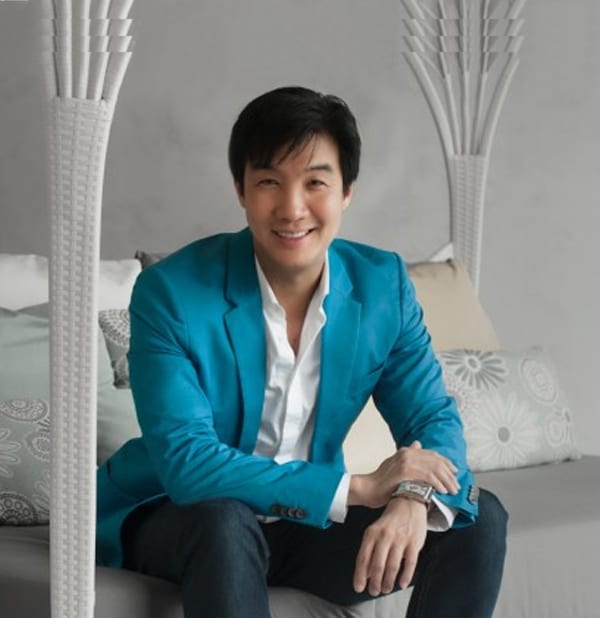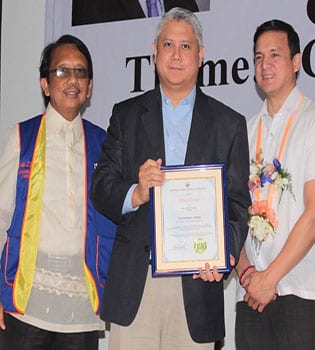
Q1: Your mother was such a big influence on you as a child. She was a furniture designer with laborers at the back of your house. She made you construct your own toys. How did you feel then as a child growing up in such an environment?
Everything I do today is an extension of my creative childhood. I took up design because I wanted to be a kid forever. As a child, my mother put pen and paper in my hand whenever she could, and encouraged me to build my own toys. I spent my free time watching all the craftsmen work behind our house. It was a happy and exciting time for me.
Q2: As a young man, you mother brought you to different trade shows around the world. What did you think of these furniture shows then? What was the impact of those early trips to you now?
I was very proud of my mom who made her own original designs to show the world. Unlike most companies who were copying trends and designs prevalent in the market, my mother designed truly unique furniture. I also understood how market forces have an effect on furniture companies and how new products were introduced. I saw with my own eyes companies rise and fall with the local and global economy. Most importantly, I understood the quality standards required from an international brand.
Q3: You failed in the entrance test of the University of the Philippines’ College of Fine Arts. How did early failure like this influence your subsequent behaviors? Please feel free to share other failures you may have encountered along the way to where you are now.
Although my early childhood was creative, my school didn’t encourage the pursuit of art. So I never developed my drawing skills through high school. After my entrance exam failure, I took off a year just to learn how to draw with private instructors. It was an uncertain time for me because I didn’t know if I was made for the profession. I persevered and eventually got into the well known Pratt Institute of New York to study Industrial Design where I graduated with highest honors. A few years ago I was invited to be the commencement speaker of the local university which initially rejected my application. The circle had come around.
Q4: Most furniture makers in the Philippines are plain manufacturers. They are not very conscious of branding. What was the turning point in your deciding to create your own luxury brand?
It was a decision based on artistic pride in the beginning rather than economic sense. In an industry not known to recognize manufacturers and their original designs, I wanted humble recognition for my creations. So I branded my own furniture and demanded that they be sold under my name. That did not sit well with most buyers. Here was a third world manufacturer who demanded how his products were to be marketed. And let’s not forget that the Philippines was not a bankable name. Anything attached to it had a third world stigma.
Q5: You make Filipinos proud and helped establish Philippines as a potential source for luxury products. Am sure it was not an easy climb, what did you have to put up with and how long did you have to endure before your brand started to be an aspirational brand?
When I started to develop my first original designs, they were very forward looking. The traditional buyer of Philippine made furniture did not come to our country expecting these unique modem designs. So for a couple of years no one ordered my products and the factory floor was empty. We had to lay off people. From a high of 300 workers we shrank to a little over a hundred. Those were trying times. My fortune changed when I started exhibiting abroad. People who used to source modern furniture only from Italy saw my designs and started to work with me. These were new buyers who never source anything from Asia. I slowly proved to them that good quality and design can also come from our country. My brand has been around for 15 years and now most companies will want my name on the door.
Q6: Many of your early designs can be traced to your inspirations from trees and the outdoors. Your first chair design, Ying Yang in 1998, was transparent, and like trees, allowed light to come thru – making it harder to create as the interior should be made as beautiful as the exterior. Why are you so fascinated with trees and the outdoor?
God is the ultimate creator and nature has been around longer than our imagination. Nature today is a vast and wide reference for medicine, technology, architecture, materials and even economic systems. Design is no different. There are so many structural principles and forms in nature that are pure and unique because they come from an Infinite Mind. The principles of beauty and aesthetics are derived from the natural world and we are programmed as human beings to react to them. My work is only a drop in the bucket of what’s possible when you take nature as an inspiration.
Q7: The price of your Voyage bed jumped seven times after Brad Pitt bought it for his kids. Tell us how did he find you (your products) and what was the strategy behind the pricing move?
The prices for the bed, and all our products, have always been the same around the world. The only exception is our country because we are closer to the manufacturing source. Other than natural inflation, we have not increased prices arbitrariiy like the fashion industry does.
Q8: Many of your more recent designs were inspired from random sources like fish nets, edges of books, crushed Coke cans and even noodles. How do you create a repeatable ideation process that your team can follow?
Design is a very fluid process and inspiration is difficult to structure. But my team and I usually work with materials first and create concepts around them. Because we have an entire factory to back us up, we work with prototypes early on and manipulate the model. We also do a lot of research to know whats out there so we know what we are up against. The whole process of idea to prototype takes an average of one year to complete. Then our engineers take over to make sure the product can be manufactured well at the right quality and price. This last process takes half a year.
Q9: You make it difficult for competition to copy your work. I have seen workers in your factory doing two patterns combined in a single furniture. What will stop competition from pirating your skilled people?
We don’t have a problem with employee turnover or piracy. Our compensation packages and work spirit are the best in the industry. My team is like family to me and they are proud to be part of a legacy being built.
Q10: Congratulations on your many prestigious awards in the field of furniture designs. Have you discovered your life’s purpose?
I believe I am called to many purposes in life, some of them yet to be discovered. My life is a story that is not complete yet. I am proud to have led the way for the furniture industry to compete globally using design but also to prove that the business model of branding can work for the entire Philippine creative industry. But more important than my work itself is the ability to inspire and motivate thousands of young people to pursue their passion of creativity and design. This is the reason why I accepted the position of program chair for the Industrial Design department of La Salle Benilde. My dream when I retire is to set up a design school specifically around craft and materials that can be found in Asia. I hope my life is a testament to what is possible when we take inspiration from our culture and environment to create unique objects and spaces for the world to see.

